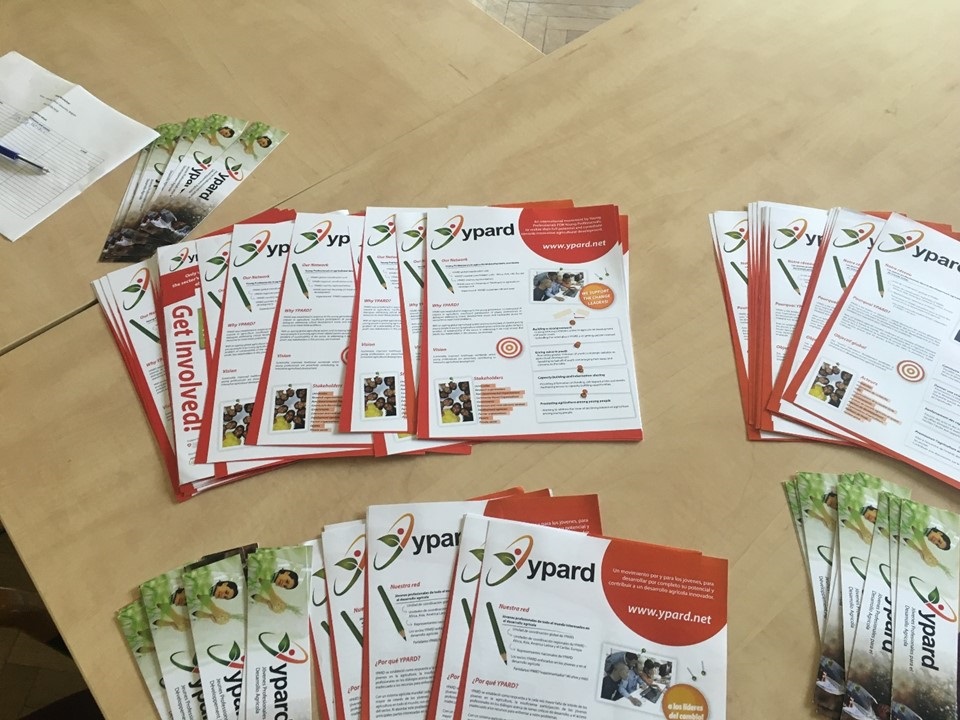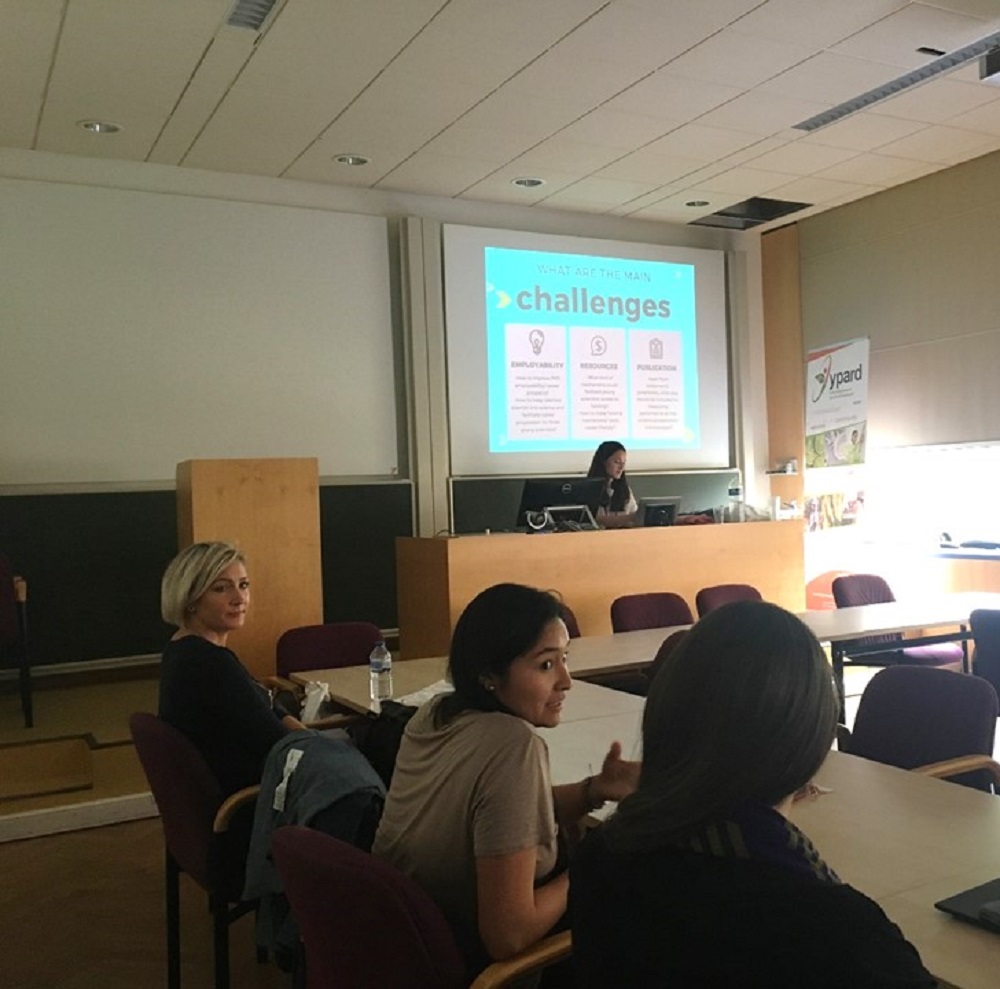-
About
- Our Work
- Get Involved
- Stay Updated
YPARD at Tropentag 2018 - Sharing information and connecting early career scientist
On Sunday, September 16th, 2018, YPARD implemented its interactive workshop at the Annual Interdisciplinary Conference on Research in Tropical and Subtropical Agriculture, Natural Resource Management and Rural Development - TROPENTAG.
This years workshop was organized at the Faculty of Bioscience Engineering, Campus Coupure in the University of Ghent, Belgium and was held as a part of the pre-conference activities. The objective of the workshop was to empower young researchers and professionals dealing with research, by facilitating linkages and transfer of knowledge with high level and experienced scientist, so that they can build the research and action that will give answers to fight against inequalities and shape a better future for all.
Introducing YPARD and ourselves
 YPARD is a well-known platform, however it never hurts to ensure that all participants have a clear idea of what YPARD is, who we are and what we do, hence Myriam Perez, gave a brief presentation of YPARD during her opening speech as the workshop facilitator, as well as, setting the agenda for the workshop and sharing the key information needed for the participants to carry out the interactive exercise.
YPARD is a well-known platform, however it never hurts to ensure that all participants have a clear idea of what YPARD is, who we are and what we do, hence Myriam Perez, gave a brief presentation of YPARD during her opening speech as the workshop facilitator, as well as, setting the agenda for the workshop and sharing the key information needed for the participants to carry out the interactive exercise.The workshop attendees were mainly students, doctoral students, scientists, extension workers, and practical farmers interested and engaged in agricultural research and rural development in transition and developing countries, as well as fellow YPARD country representatives and active members from Albania, Kosovo, Moldova, Peru and Kenya gathered to share their thoughts about career aspirations and the existing mechanisms that are supporting them on that progression with the objective to enable group dynamics that would lead the workshop session. Each participant was provided with an open space to introduced themselves and to let their voice be heard! The workshop provided a perfect environment for networking and peer to peer learning.
Enabling the discussion - The realities of early career scientists
How do early career scientists progress once they are in the job market? How do we improve the quality of the employment? Myriam reflected on these important topics as the main point in her presentation at the workshop which was one of the main direction of the discussion throughout the event. There is an increasing concern about the situation that the early career professionals face when they have to find a position after their studies.
To put the topic into perspective, Myriam presented various cases regarding this increasing concern from the journal Nature and other journals and organizations which made special issues about young scientists and their adversities, she also highlighted throughout these case studies that young scientist today face a harsher, more competitive, more dispiriting workplace than their bosses and senior colleagues did at the same stage of their own careers, In order not to raise a too dark picture she also presented a few concrete through small actions and existing initiatives that help junior researchers to grow their career prospects.
Moving forward by reflecting on our now!
As it was quite evident that there is very little research on the strategies to best support early career researchers, the workshop provided a space for participants to express their concerns as early career
 scientist so that YPARD can bring something and contribute to the lack of research in this topic and so identify possible pathways that that could be followed up after the workshop discussion.
scientist so that YPARD can bring something and contribute to the lack of research in this topic and so identify possible pathways that that could be followed up after the workshop discussion.The workshop discussion focused on answering the questions related to employability: how could we improve the employability of early career scientists and how to keep these talented scientists into science? As regards resources: what kind of mechanism could facilitate young scientists access to funding and how to make funding mechanisms early career-friendly? And last but not least, related to publications: apart from bibliometric parameters what else should be included for measuring the performance so that ambitious aspirations in encouraged. Each participant provided their input on the questions raised.
As a Ph.D. candidate, I am concerned if I will have the chance to continue my career on research since employment in this field is particularly hard for youth coming from developing countries as myself. To improve the employability of early stage career scientist and to facilitate access to funding by youth, eligibility and evaluation criteria to apply for funds should positively discriminate youth e.g. it can be done by simply making it mandatory for at least one early stage career scientist participation in the project team.-Hana Voca, YPARD Kosovo representative
Employing young scientists and keeping them within science is a challenge in itself. On the one side, scientists should be focused on their scientific research, but on the other hand, these researches, except that require time to be implemented and seek monetary costs. Also, these scientists need to work somewhere and be paid to secure their livelihoods and their families and also to provide money to cover the cost of their scientific research if they are not funded by institutions, organizations, donors or other actors and stakeholders supporting them Bledar Meta, YPARD Albania representative
Overall the workshop mainly revolved around sharing a common diagnosis about how early career scientist envisions entering the job market. The questions discussed through the workshop were related to employability and resources in relation to early career scientists.
Questions:
how could we improve the employability of early career scientists and how to keep these talented scientists into science?
Related to resources: what kind of mechanism could facilitate young scientists access to funding and how to make funding mechanisms early career-friendly?
So what did we discover?
Throughout the discussion, it was evident that employing young scientists and keeping them within science is a challenge in itself. On one side, scientists should be focused on their scientific research, but
 on the other hand, these researches require time to be implemented and have a monetary cost. Scientists also need to work somewhere and be paid to secure their livelihoods and their families as well as provide money to cover the cost of their scientific research if they are not funded by institutions, organizations, donors or other actors and stakeholders supporting them.
on the other hand, these researches require time to be implemented and have a monetary cost. Scientists also need to work somewhere and be paid to secure their livelihoods and their families as well as provide money to cover the cost of their scientific research if they are not funded by institutions, organizations, donors or other actors and stakeholders supporting them.Keeping these scientists within science and improving their employment could be based on some suggestions as below:
? Helping them with preparing CVs, job searches and applications
? To provide accurate and realistic information about the academic labor market
? To provide Careers service
? To provide Training in research methods beyond their own specialism
? To provide Space for offices and support facilities
? To provide Small grants for developing their researches and teaching
? To provide Information, advice, and guidance on work outside academia
? To provide a structured career development program
? Creating Doctoral Training Centers if there are none that can play leading roles in developing, training and supporting early career researchers
And last but not least, mechanisms to facilitate young scientists to access funding and how to make early career-friendly funding mechanisms can be diverse and varied but they are a few alternatives to be explored such as:
? Online information
? To provide funding for conferences
? Funding for publication fees
? Smaller-scale funding through a less time-consuming
? To provide access
Hence, the way to move forward is clearly to provide early career scientist with the support they need to continue in research and to obtain feasible job opportunities. YPARD is doing its part by supporting young agricultural professionals through its platform by youth for youth to realize their full potential in agriculture and agricultural development, on our website https://ypard.net/opportunities you can find great jobs and funding opportunities in various agricultural fields, it also provides a voice for the youth to express their thought and voice their views in regards to their reality worldwide!Picture credits: Hana Voca
About the author
Related Posts
Comments
No comments made yet. Be the first to submit a commentBy accepting you will be accessing a service provided by a third-party external to https://archive.ypard.net/
Get in touch
Email: [email protected]
YPARD Global Coordination UnitHosted by AGRIDEA and the Czech University of Life Sciences Prague
Lausanne, Switzerland and Prague, Czech Republic - Our Work

